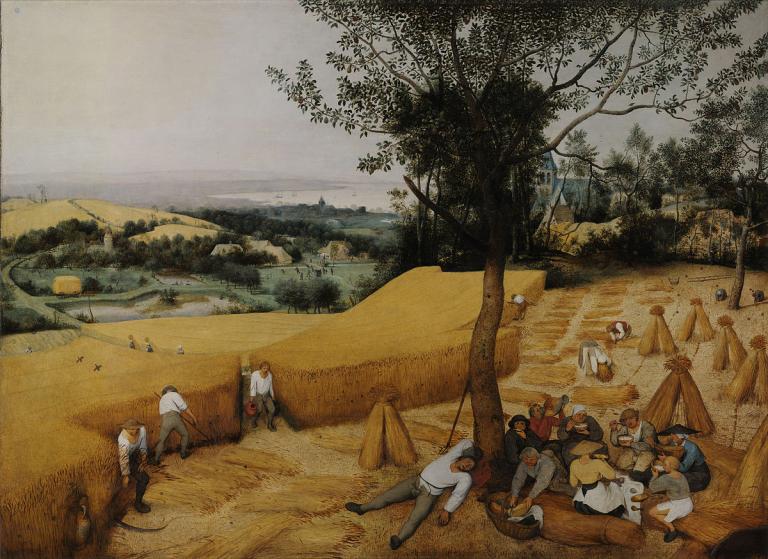The doctrine of vocation has been catching on. There is now something called the “Faith and Work movement,” with think tanks, publications, and programs designed to show Christians the connection between the two. (The founder of at least one of these think tanks told me that my book on vocation, God at Work, was the catalyst for his interest in the subject, which I appreciated.) But this movement may have drifted away from the specific insights that the great theologian of vocation–Martin Luther–has to offer.
Christianity Today’s cover story this month, God of the Second Shift by Jeff Haanen, calls for a rethinking of vocation. It says that much of what evangelicals have been doing with “Faith and Work” is oriented to middle class, white collar workers. The emphasis is on “following your bliss,” finding self-fulfillment, and helping college students choose a career. Working class jobs, though, the hard, often tedious labor that most people in the world have to do just to survive, get little attention. Is there a doctrine of vocation for them?
First of all, Luther’s doctrine of vocation is precisely about farmers, craftsmen, builders, laborers, milk maids, and others who work with their hands. (Luther himself was from a family of miners.) And while acknowledging its satisfactions, it also deals with work as a realm of tribulation, frustrations, and cross-bearing. For Luther, vocation is about God and the neighbor, not the self. It is all about God working through you, as you sacrifice yourself in vocation out of love and service for your neighbor.
Those who want to rethink vocation will find lots of help in the Swedish theologian Gustaf Wingren’s classic book Luther on Vocation.
Some of you may remember a post I wrote here responding to someone who cited the “danger” of Luther’s doctrine of work.
He said that Luther’s ideas can make people who are stuck in dead-end jobs content with them, rather than bettering themselves. He illustrated his point by telling about his college job at a milk-processing factory, how back-breaking and boring it was. That was not a “vocation,” he said. His job after graduating from college–being a professor of theology–was his true calling from God. Working in a factory was just a “job.” He then discussed a lady who worked with him on the canning line, how she had worked there for 15 years and how pathetic and “dehumanizing” that was.
I answered the article at length, explaining what what Luther’s doctrine of vocation is and the misconceptions about it. But then I said this, which addresses the issue raised in Christianity Today:
The one thing, though, that really bothers me in Prof. Doriani’s post, is its attitude towards that woman who had been working in that “dehumanizing” factory for 15 years.
That milk-processing factory was a means by which God provides milk to children–part of the “daily bread” that He provides to all of us. The purpose of work, again, is for the neighbor, not the self. Young Doriani would be called to serve as a businessman, as a college administrator, as a pastor, as a professor. This woman stays at that milk factory. This is reason to honor her. Not to minimize what she does.
Luther writes about vocation in terms of bearing the cross, of sacrifice, of self-denial. When you love and serve your neighbor, you deny yourself out of love for that person. Vocation is not about self-fulfillment, or enjoying your work, or not feeling drudgery.
Some work is less pleasant than others. That work is often despised by the world, in favor of more prestigious and better-paying positions. Often, those despised jobs–trash collecting, cleaning hotel rooms, tending to sewers– involves a level of love and service to the neighbor that far exceeds the socially prized work of, say, Hollywood actors and professional athletes.
In fact, I might argue that the more praised positions can be more “dehumanizing” than the more lowly ones. That is, positions that bring affluence and prestige–including, I can say from personal experience, academia–can take a toll on the “humanness” of those in the position, as well as those under their authority or those their position is supposed to serve.
Luther’s doctrine of vocation does not prevent the woman in the milk factory from taking another job or working to improve conditions at the plant or taking night courses to help her move up in the world. But it does or should prevent the rest of us from looking down on her or her work.
Painting, “The Harvesters” By Pieter Brueghel the Elder (1565) – PAH1oMZ5dGBkxg at Google Cultural Institute, zoom level maximum, Public Domain, https://commons.wikimedia.org/w/index.php?curid=22554956














